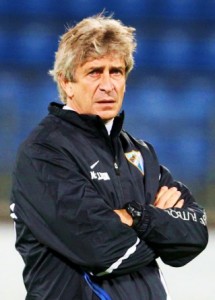On the 1st of February, Manchester City confirmed the long rumored news that their current manager, Manuel Pellegrini, would be replaced at the end of the year by Pep Guardiola, the current Bayern Munich manager. Guardiola, long considered one of the best managers in the game, has had a great deal of success at both FC Barcelona and at Munich. Pellegrini, on the other hand, has been, well, also one of the best managers in the game. Why did Manchester City feel such a necessity to make a change? It’s not an easy process: Perhaps the best comparison to make is that of their last 2 seasons; that is when both men started in their respective jobs.
At Bayern Munich, Guardiola has managed 137, and has won 105 of his games. At Manchester City, Pellegrini has won 93 of his 146 games. Furthermore, Pellegrini won 64 of his first 99 games as a premier league manager, a record only surpassed by ‘The Special One’, Jose Mourinho (who also, coincidentally is out of a job). So the win-loss record alone is not enough to really suggest any difference between the two.
Most pundits argued that the main reason for the switch is the issue of silverware. Guardiola, in his time at Barcelona and Bayern Munich has developed a reputation as a manager who delivers at the highest level: specifically, the Champions League. It’s a league notoriously difficult to win, and yet Guardiola has won twice and never finished worse than 4th in his career. Pellegrini, meanwhile, has never won the top flight championship, and in fact has underperformed based on ownership expectations.
Other arguments revolve around tactics: Guardiola has been lauded for his tactical changes through the years, while Pellegrini has similarly been disdained for his inability to change. Pellegrini’s use of a traditional 4-4-2 with no changes originally worked well for Manchester City, as the combination of Alvaro Negredo and Sergio Aguero up top stretched defenses with David Silva and Samir Nasri running the wings. However, with some regression of his players and bad injury luck, City’s scoring has markedly dropped off since the early days of Pellegrini’s tenure, with 103 scored his first year and 83 in his second. Even with these noted drop offs, Pellegrini refused to alter his 4-4-2. Guardiola is seen a much more dependable tactician, and is a known tinkerer. Just this year, his Munich squad has played 4-3-3, 4-3-2-1, 4-1-4-1, 4-2-2-2, 3-5-2… the list goes on. So far Guardiola has deployed more than 9 different formations. So at least in tactical flexibility and silverware, Guardiola is a marked advantage over Pellegrini. Is that enough though to depose one of the winningest managers in English history (at least percentage-wise)?
The fact of the matter is that the job of the Premiership manager in England is one of the most tenuous in sport. In fact, it’s such a tenuous job, there is an entire industry around betting on which manager is next to be sacked.
This table from the last link actually tells us a lot about how the status of a manager has almost nothing to do with win percentage. Odds like Louis Van Gaal’s are far greater than someone like Quique Flores, even though he has a much higher win percentage. It really is an issue of clout and importance, especially on the stages of the world’s biggest clubs. It really isn’t confusing as to why Manchester City, Chelsea, and Manchester United, three of the biggest (and certainly most expensive clubs in England) have gone through 11 managerial changes since 2013 alone. Manager stability simply doesn’t exist anymore: the Premiership, especially at the Champions League Qualifying Level, is all about what you’ve done lately. In this respect, maybe the question we should be asking is not why Pellegrini was released for Guardiola, but rather, why did it take so long? Welcome to the Premier League, where you can win titles one year, and the next finish second, and the next be released. Success is measured in minutes, not years. Unless your Arsene Wenger. Then you’re safe.



It seems to me that working at the Premiership is a lot like playing soccer. It’s the minutes as you said that matter not the years. It’s those crucial moments and seconds in a soccer game that can define a player. Soccer players’ lives and skill is based off of their ability to act with snap decisions in high stress situations. Being slow to decide or overly contemplative doesn’t do any good and definitely doesn’t win games. Thus is seems managing these teams requires equally the same amount of agility, flexibility, and dynamism. By constantly changing managers this also enables these elite clubs to ensure that their players are constantly on their toes and do not take anything for granted or get used to a certain manager’s style.
Soccer is about innovation and outwitting the opposing team and by changing the manager every couple of months this changes the dynamics between the players between the manager and the players and the players and the opposing team. The more high intensity it is the great the chance of change and innovation.
I also believe that by constantly changing managers these elite clubs are signalling in a way to the rest of the world and the players that anyone is replaceable and only the best at that moment is desired. You either keep up or get dropped.